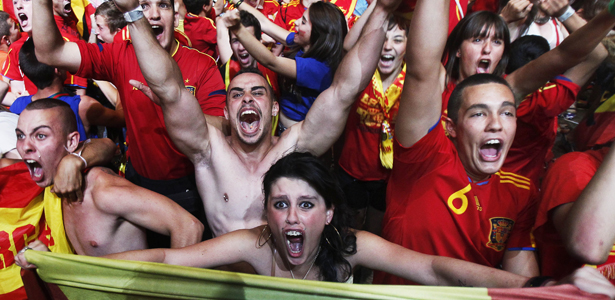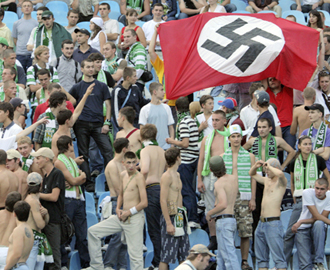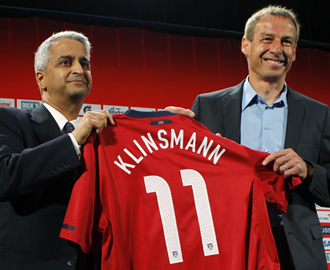Why Being an Obsessed Soccer Fan Can Make You Really, Really Happy
Rooting for a team isn't about sports—it's actually about relationship-building.

It's been more than 15 years since Alex Paz moved to the U.S. But since then, if he could help it, Paz—who was born in a small town in Galicia, Spain—has never missed any of the Spanish national team's soccer games. Be it an international friendly against Venezuela or the World Cup Final against The Netherlands, Paz has been there, albeit at a distance, cheering his home team
"It's about a national identity," said Paz, speaking to me on Saturday at Smithfield, a new soccer bar in midtown Manhattan. "I feel even more Spanish when I'm watching soccer."
Paz, 43, a New Jersey resident, made the trip across the Hudson to Smithfield with a couple of Spanish friends to watch his team play France in the quarterfinals of the Euro Cup. For those 90 minutes, Paz could have easily felt like he was back in Spain. There was red everywhere. There were girls with the colors of the national flag painted on their faces. And there was an intrinsic bonhomie that gave the occasion a special edge.
"Here in New York, you walk the streets, and you see people with Spanish shirts on. It just feels terrific," said Paz. "There is no greater bond than sport, particularly soccer." In the past, the Spanish national team has been known for its lack of unity. But in 2008 when it won the European championship in Austria and Switzerland, Spain, perhaps, felt one of its earliest senses of a strong national accord. "There are now three Basque players in the national team," said Paz, "They play at their best when they put on the Spain shirt. It brings the different regions of the country together, and I just feel really privileged watching the team."
Trying to rationalize fandom can be a complicated, even futile process. But studies by psychologists have shown that identifying yourself with a sports team can have profound implications. According to Daniel L. Wann, a professor at Murray State University, and a pioneer in the field of sports psychology, the more passionate your fandom, the more positive the impact is on your psychological health. Based on surveys of American sports fans over more than two decades, Wann has categorized fans in relation to the degree to which they consider their team an extension of themselves. He describes the more ardent fans, the ones who consider their team to be an important part of their lives, as "highly identified" fans, and the ones who follow their team more loosely, with a sense of detachment, as "weakly identified" fans. He says, in the case of the highly identified fans, the social connections that are formed through their fandom—the camaraderie that comes out of following games with a group of people—plays a significant and positive role in their lives.
MORE ON SOCCER
He uses the example of fans of the St. Louis Cardinals who live in St. Louis and surrounding communities where it's easy to find other supporters. "Many individuals wear Cardinal apparel, discuss the team in casual conversation, and structure their day around consumption of the team (e.g., going to games, watching the team on television, etc.)," Wann wrote in a 2006 paper. "In environments such as this, fans of a local team can feel part of something grander than the self. They gain vital connections to others in their community and a feeling of camaraderie."
But supporting your national team goes beyond the traditional contours of fandom, and in many ways transcends sport. Supporters—both highly identified and weakly identified ones—may only come together for short periods (as is the case during a World Cup or a European championship), but an inherent feeling of nationalism helps them find a strong, common bond.
In his book How Soccer Explains The World, Franklin Foer argued that nationalism as evoked by soccer fandom can play a positive role in society. "Humans crave identifying with a group," Foer wrote. "It is an unavoidable, immemorial, hardwired instinct. Since modern life has knocked the family and tribe from their central positions, the nation has become the only viable vessel for this impulse. To deny this craving is to deny human nature and human dignity."
At bars such as Smithfield where expatriates from different countries come together to watch the soccer, not only does a nationalistic craving help create ties between fans of the same team, but the tribalism at the root of the fandom is surpassed creating a unique festival-like-atmosphere, where fans from different teams mingle together and find a common ground.
"It feels like you're at a stadium," said Tom McCarthy, one of the co-owners of Smithfield. "You can feel like you're in your home country even though you aren't. But the great thing is that you're bantering and having an amazing time with fans of the other teams too."
Sean F. Brown, an editor at Soccer and Society, a bi-monthly journal, says that for expatriates, soccer is one of the few things that can remind them of home: "Bars and clubs where you can watch soccer together with people from your country plays a pretty substantial role in community building." Brown recognizes that competitions such as the European championship brings people together only for a short time, but he believes that the relationships that are developed are still important.
"What we lack is a large unifying force, and I think that's a void that can be filled by sport," said Brown. "Sport, particularly on a large scale, national level, still has the ability to act as a unifying force." Brown refers to Spain's example in highlighting the role that sport can play in developing stronger relationships. "The big question has always been whether the players from Real Madrid could co-exist with those from Barcelona," said Brown. "In the last few years, the Spanish national team's success has proved that they can. I think this translates onto the fans too. You have people from different regions coming together to support Spain, and that can only be good. This is the classical justification for sport at a national level."
The exclusionary aspect of sport, Brown however believes, hasn't been sufficiently examined. "What does the national team mean to those who don't care about sport?" At Smithfield and Legends—another midtown soccer bar—there were a number of fans who wouldn't otherwise watch soccer involved deeply in the European championship's spectacle. Italy's result against England mattered to them, seemingly, just as much as it would have for the more consistent sports fans. Perhaps Wann's distinction between weakly identified and highly identified sports fans is diluted during these international events. The emotional responses, at least on the surface, seemed just as powerful in the weakly identified sports fan.
But more than these implications, it was the friendships and the camaraderie that the European championship has helped create among expatriates that were most palpable. The England versus Italy quarterfinal, for instance, saw every square inch of Smithfield occupied. There were new friendships being formed with soccer acting as the fulcrum. On the first floor, more than 200 fans crammed together, sang "God Save the Queen" heartily and cheered England through every minute of the game. There were regular match-goers as well as others who were using the occasion to make new friends.
Tony Keefe, who had moved to New York from London more than 10 years ago, was seated with a group of fans on a corner table on the second floor. Keefe only knew Greg Zalka, a fellow London native, and a couple of others at the table. But Zalka had invited a number of his friends and they in turn had invited others, creating a big party of English fans that was integrated through the national soccer team. "It's all about the camaraderie," said Zalka, who like the others was dressed in an England jersey. "We may not get this back home, where we're essentially with our own group of friends and family. Here we get to see other fans, and make so many great connections. We have a common passion and interest, and in the end, it's all about the company."



